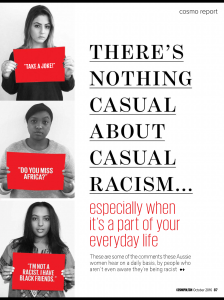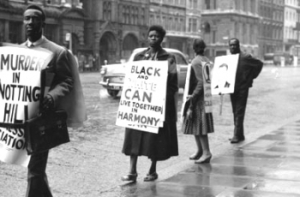It’s Nothing New
by Shane Thomas Follow @tokenbg
Racism. The obvious kind. We saw plenty of it in 2016. We’re likely to see more in 2017. But we’re less likely to get a nuanced analysis of it from the thinkpiece carousel. In truth, there’s the overt racist, the anti-racist, and a whole lot in between.
You can be against racist police profiling, yet simultaneously have a reflexive unease around a voluble black teenager on their phone. You can have people of colour as friends, yet if you saw one being abused in public – while you wouldn’t join in with the abuse – you also wouldn’t try to help them. This is an advantage of white supremacy being such a flexible and multi-layered ideology. Like a box of Quality Street, one can select the specific pieces that suit them.
Carvell Wallace detailed that,“There is a generous middle ground between making choices that are racially problematic and being a cross-burning Klan member. But the abject fear most people have of being called racist at all renders that middle ground inaccessible. And so racist behavior continues to take place, even at the hands of people who are basically decent.”[1]
An example of this came from journalist, Tim Montgomerie. In the aftermath of Brexit, Heydon Prowse – pretending to be a racist Leave voter – breezily put it to Montgomerie that Brexit was a win for white people only. Possibly not aware that Prowse was in character, Montgomerie recoiled, and walked away. But what he didn’t do was challenge that viewpoint.
You would think anyone not motivated by racism or xenophobia who voted Leave – and we were informed there were plenty of them – would be invested in ensuring Brexit wasn’t a stimulant to commit racist and xenophobic acts. That we would have explicit statements (repeatedly if needed) that such views were unwelcome; assuming their only concern was “economic anxiety” – surely the euphemism of 2016.
 Fighting against racism is a conscious act – with emphasis on the “act”. For clarity’s sake, Montgomerie did what many would do in a similar situation (I’ve also been guilty of this) and while such non-committal behaviour avoids personal conflict, it also makes for a heavier load to carry for those faithful to anti-racism. Would we have a far-right bushfire that’s threatening to turn the world to ash if white people had attended to it before it could spread?
Fighting against racism is a conscious act – with emphasis on the “act”. For clarity’s sake, Montgomerie did what many would do in a similar situation (I’ve also been guilty of this) and while such non-committal behaviour avoids personal conflict, it also makes for a heavier load to carry for those faithful to anti-racism. Would we have a far-right bushfire that’s threatening to turn the world to ash if white people had attended to it before it could spread?
Racism doesn’t occupy a benign state. This isn’t a game that started at 0-0. It’s more like starting 3-0 down with only 25 minutes left. That’s why common refrains of “I don’t see race”, or, “I don’t care what race you are” aren’t neutral, but destructive. To make racism stop, you have to care.
What struck me about Brexit was that while some complained various right-wing interests conned enough of the British public into believing their struggles were down to excess immigration, how much convincing did they really need?
Holding a racialised and/or foreign populace accountable is an easy lie to peddle when delivered through the prism of nativist whiteness. I can attempt to rebut this consensus. I can reference reports, charts, and statistics. But it’s largely impotent when opposed by a lie that has been told and believed for generations[2]. To quote Jack Kellam, “Racism has always had a hearing. The same cannot be said for the fears of those afflicted by it.”
One of the material legacies from that referendum was another lie; that the white working-class are chronically racist. This not only fit into an already existing template, but also aided the continuation of white supremacy, as Britain only comprehends racism when it manifests in the form of shaved heads, working-class accents, social media abuse, or a lack of formal qualifications.
Framing such features in this manner (as Jacinta Nandi explored) absolves characteristics such as upper/middle-class diction, expensive attire, and jobs that earn in the high five-figures. Locking in the idea of the working-class as white benefits the powerful, not only because it leaves people of colour outside the conversation, but it also obstructs opportunities for working-class people of all races to find common ground. Identity politics works fine for the privileged when it’s not intersectional.
Ta-Nehisi Coates elucidated on how whiteness can be a marker of both safety and integrity; “…white grievance, no matter how ill-founded, can never be humiliating nor disqualifying… White racial grievance enjoys automatic credibility, and even when disproven, it is never disqualifying of its bearers… The need to be white is a sensitive matter—one which our institutions are inexorably and mindlessly bound to protect.”
We’re in a time when the prolonged efforts of the marginalised are forcing the dominant culture to consider cross-sections of society it never previously had to. Yet while legislative gains have been made, addressing these problems in depth remains elusive; an explanation for which can be found in the words of Upton Sinclair, “It’s difficult to get a man to understand something when his salary depends upon his not understanding it.”
A simplistic grasp of race is necessary for the structure to retain its potent imbalance. Eleanor Penny observed thus; “From a white perspective, white supremacy makes sense. It’s deeply evil, profoundly shortsighted, morally indefensible and gut-wrenchingly grotesque, but it wouldn’t have survived for so long if it did not, according to a venal account of reality, make a kind of sense. It’s a bargain made between the white ruling classes and the white working classes: in return for your support, we will provide you with someone to look down on, someone to be better off than.” Anyone who’s played chess will know that the power of the king and queen come only from its juxtaposition to the pieces around it, especially the pawns.
It’s not that every white person is racist, but that every white person has the capacity to be racist. And are they often so awkward around this topic because it was their ancestors who created race as we know it, and didn’t do so for good?
Reverting to a state of defensiveness when being called out is like reverting your computer back to Windows 3.1 to do a business presentation. No white person reading this should think I’m trying to cause them feelings of “white guilt”. What I’m trying to elicit isn’t guilt, but sensitivity. Sensitivity to how being a person of colour affects one’s life experience, so you’re aware why that poppadom joke isn’t funny, or why you shouldn’t wear your hair like that.
“Racism isn’t just a bad feeling in your heart, as a liberal believes when she insists that she isn’t at all racist”, Gavin Mueller declared. “It’s a force that emerges from the pressures of maintaining one’s own position, and the resentments that spring forth from this process.” This is why the power of unspoken racist deeds uphold the power of racist words.
 Slurs are just the fruit that falls from a rancid tree. Until our education curriculum teaches about how Britain was forged; until we have an understanding of feminism that includes Claudia Jones as well as Emmeline Pankhurst; until we learn about Churchill the bigot as well as the orator; until African names aren’t a hindrance to employment; until there’s a cost for the taking of black life beyond administrative leave, the slurs aren’t going anywhere. It’s like a parent telling their child not to swear. They’ll only stop when their parent’s in earshot.
Slurs are just the fruit that falls from a rancid tree. Until our education curriculum teaches about how Britain was forged; until we have an understanding of feminism that includes Claudia Jones as well as Emmeline Pankhurst; until we learn about Churchill the bigot as well as the orator; until African names aren’t a hindrance to employment; until there’s a cost for the taking of black life beyond administrative leave, the slurs aren’t going anywhere. It’s like a parent telling their child not to swear. They’ll only stop when their parent’s in earshot.
Our collective understanding of race is groupthink largely absent of thought. This is no accident. As Brian Phillips said, “Confusion is an authoritarian tool.” Racism – as with all types of oppression – is for the purpose of assembling power by causing harm. The point of any anti-racist cause is to allow people of colour access to power that doesn’t harm, so they also have a fair chance to lead fulfilling lives.
Even if one can get people to acknowledge that racism exists, it can be tougher to get them to acknowledge where. Because if there’s no racism in our jobs market, our dating preferences, or our cultural output, then where can it be found?
Of course, it’s not that racism doesn’t exist. It’s that it’s not a problem. It’s not an inconvenience. Nor is it an imposition to those who are deemed important. We may only see a change when most of the white population begin to ask questions of themselves, instead of assuming they have all the answers.
It’s perfectly right to be disgusted by racism. It’s pointless to be surprised by it. Racism isn’t aberrant. It’s mundane. And it shouldn’t have needed a series of referendums and elections to make that clear.
[1] – It should be remembered that the Klan were once a bastion of America’s middle class.
[2] – Even a relatively empathetic look at the topic was entitled, “Our Jamaican Problem”.
All work published on Media Diversified is the intellectual property of its writers. Please do not reproduce, republish or repost any content from this site without express written permission from Media Diversified. For further information, please see our reposting guidelines.
“Two Weeks Notice” is Shane Thomas’s bi-monthly column encompassing “Pop culture to sport, and back again“ Shortlisted for EI Arts, Culture and Entertainment commentator of the year 2015
Shane can be found on Twitter, both at @TGEISH and @tokenbg (and yes, the handle does mean what you think it means).

Seeing as essex man is catergorised as being white, I’d add Shami chakrobartis save me from Essex man ,quote, to a case of 2016 racism,
LikeLike